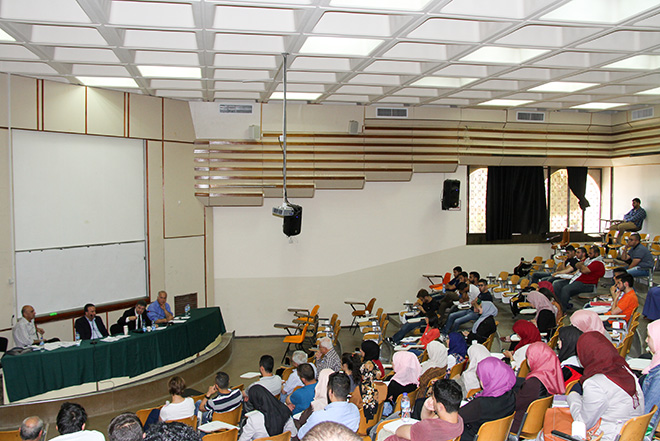Experts, Officials Address Palestinian Economic Challenges
Key challenges faced by the Palestinian economy and related Palestinian Authority policies were the subject of an April 20, 2016 lecture sponsored by the Faculty of Business and Economics.Speakers included Department of Economics chair Said Haifa, Department of Economics faculty member Yasser Abu Hijleh, Undersecretary of the Ministry of Agriculture Abduallah Lahlouh, and the spokesperson for the Ministry of Agriculture Azmi Abdul Rahman. They reviewed critical economic areas in Palestine, especially agriculture and assessed the government’s role in combating challenges.Haifa said that Palestinian development has been subject to extremely harsh circumstances under the Israeli occupation, which reinforces Palestinian dependency on the Israeli economy.Abu Hijleh said that the economic development process has been stalled since the establishment of the Palestinian Authority. “The process of Palestinian economic development has long been subordinated to the political process between Israel and Palestinians, which is stalled. The Authority has become dependent on foreign aid and Israel to sustain itself, rather than being able to develop a viable, independent economy.” He said that the conditions in which the Palestinian government was established have “slowed down its ability to build an independent, vibrant economy.”Lahlouh emphasized the importance of agriculture as an important contributor to the economic development process. “Agriculture not only provides communities with food and jobs, but is a mean of self-sufficiency and independence.”“Israeli measures are depriving Palestinians from benefiting from this source of self-sufficiency.” He went on. “The Separation Wall running through the West Bank, for example, isolates thousands of families from their land, in addition to confiscating lands and restricting movement and export, which as a result threatens food security and the already fragile economy.”Abdul Rahman said that the problem of dependency is rooted in the Nakba in 1948, when Jews were obliged to invest in Palestine as soon as they settled. “Dependency on Israel has been increasing since then and significantly deteriorated after the second Intifada in 2000, to make the Palestinian market reliant on consumption not production,” he concluded.







